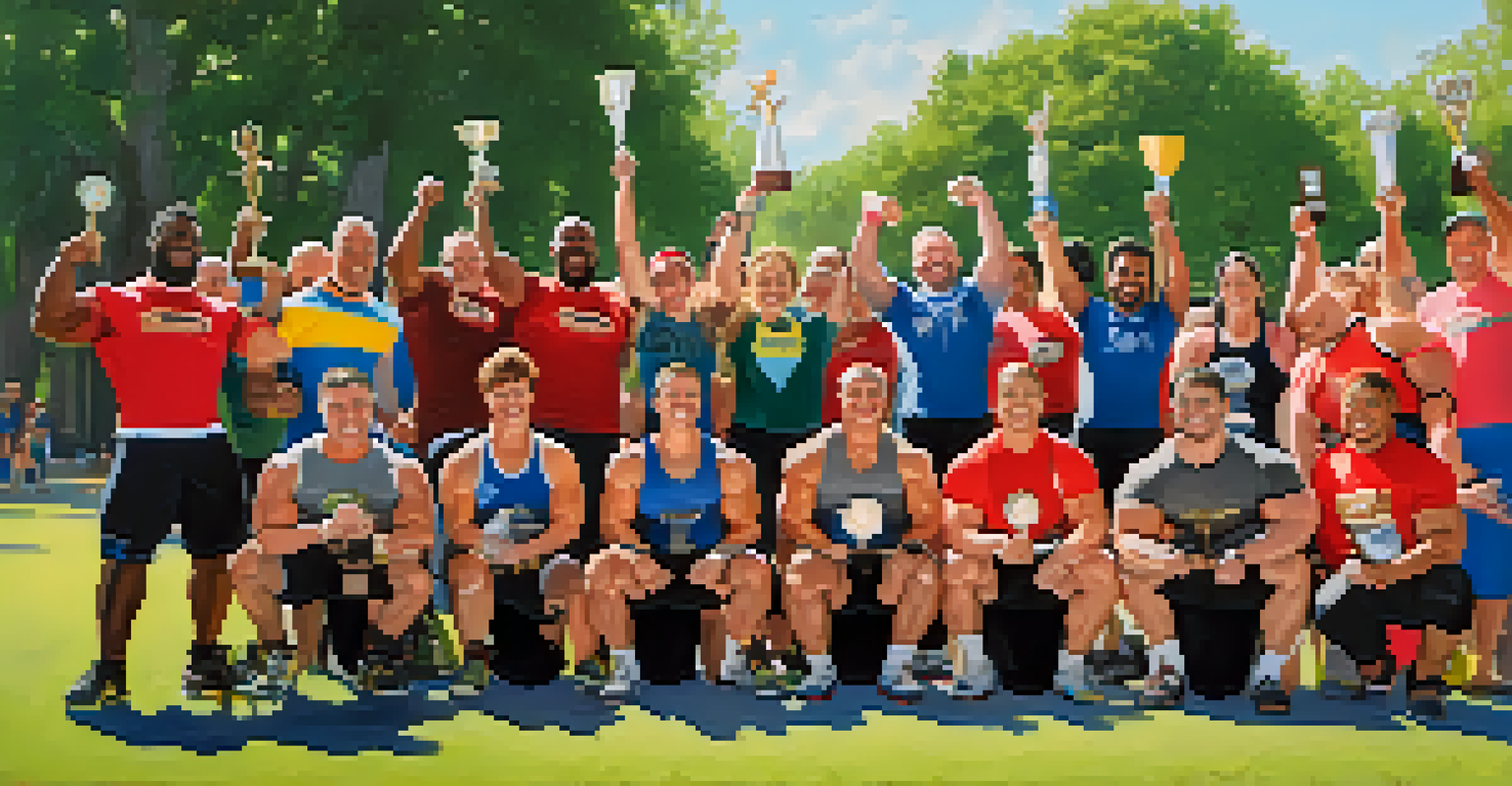Setting Realistic Goals for Powerlifting and Life Balance

Understanding the Importance of Realistic Goals
Setting realistic goals is crucial for anyone looking to excel in powerlifting and maintain a balanced life. Without achievable targets, you may find yourself overwhelmed, leading to frustration rather than progress. Think of goals as stepping stones on your journey; they should be challenging yet attainable, allowing you to build confidence and momentum.
Setting goals is the first step in turning the invisible into the visible.
When your goals are realistic, they align with your current abilities and resources. This alignment not only enhances your motivation but also helps you navigate the inevitable ups and downs of training and life. For instance, if you're new to powerlifting, aiming to lift double your body weight in just a few months might set you up for disappointment.
Instead, focus on incremental improvements that celebrate your progress. Maybe it's adding five pounds to your squat each week or mastering your form. This approach fosters a sense of achievement and keeps you engaged in both powerlifting and your everyday life.
Assessing Your Current Strength and Lifestyle
Before setting goals, it’s essential to assess where you currently stand. Take stock of your strength levels, training experience, and lifestyle commitments. This evaluation helps you understand what’s realistic and what might be too ambitious given your circumstances.

For example, if you're juggling work, family, and social obligations, you may not have the time to commit to a rigorous training schedule. Acknowledging these aspects allows you to create a plan that fits seamlessly into your life rather than clashes with it. It’s like fitting pieces into a puzzle—everything needs to align for a complete picture.
Set Realistic and SMART Goals
Establishing specific, measurable, achievable, relevant, and time-bound goals ensures progress in powerlifting while maintaining motivation.
Additionally, consider how your current mental and physical health impacts your training. If you're feeling fatigued or stressed, it may be wiser to focus on recovery or lighter training goals. This self-awareness plays a vital role in maintaining balance while pushing your limits in powerlifting.
SMART Goals: A Framework for Success
One effective method for setting realistic goals is the SMART criteria: Specific, Measurable, Achievable, Relevant, and Time-bound. By following this framework, you can ensure your goals are well-defined and structured. For instance, instead of saying, 'I want to lift more,' you could set a goal like, 'I will increase my deadlift by 10 pounds in the next month.'
Success is the sum of small efforts, repeated day in and day out.
This specificity makes it easier to track your progress and stay motivated. When you have clear metrics, you can celebrate your achievements along the way, which boosts your confidence. Plus, knowing exactly what you’re working towards helps you focus your training efforts effectively.
Additionally, incorporating a timeline creates a sense of urgency and commitment. By establishing deadlines, you’re more likely to stay accountable. Just remember, if you need to adjust your timeline due to life’s unpredictability, it’s perfectly okay—flexibility is key in both powerlifting and life.
Balancing Training with Other Life Commitments
Achieving success in powerlifting doesn’t mean sacrificing other important aspects of your life. Finding a balance between training, work, family, and leisure is essential for long-term happiness and success. Think of your life as a well-balanced meal; each component must be present for you to thrive.
To maintain this balance, consider creating a weekly schedule that allocates time for training while also setting aside moments for relaxation and family. This way, you’re not just a powerlifter; you’re a well-rounded individual who enjoys various facets of life. A fresh perspective from your time away from the gym can even enhance your performance when you return.
Balance Training with Life Commitments
Finding harmony between powerlifting and other life responsibilities is essential for long-term happiness and success.
Moreover, be open to adjusting your training frequency and intensity based on what else is happening in your life. If work is particularly demanding one week, it may be wise to reduce your training load. This adaptability is vital for sustaining your passion for powerlifting while enjoying your life outside the gym.
The Role of Support Systems in Achieving Goals
Having a strong support system is invaluable in your journey towards powerlifting goals. Friends, family, coaches, and fellow lifters can provide encouragement, accountability, and even practical help with your training. When you share your goals with others, it creates a sense of community that can motivate you to push through challenges.
For example, joining a local powerlifting club or finding a training partner can significantly enhance your experience. Not only do you gain a sense of camaraderie, but you also have someone to celebrate your victories with and help you stay on track. This social aspect can turn a solitary pursuit into a shared adventure.
Remember, it’s not just about lifting weights; it’s about building relationships and creating a network that supports your aspirations. When you surround yourself with positive influences, it’s easier to remain focused and committed to your goals.
Tracking Progress and Adjusting Goals as Needed
Regularly tracking your progress is essential for staying motivated and ensuring your goals remain realistic. Whether it’s keeping a training journal, using an app, or simply noting down your lifts, having a record helps you visualize your growth. This reflection can be incredibly rewarding as you see how far you’ve come.
However, it’s also crucial to be flexible with your goals as circumstances change. If you find that your initial targets are too easy or too difficult, don’t hesitate to adjust them. Think of it like steering a ship; sometimes you need to change course to stay on the right path.
Importance of Support Systems
Having a strong network of friends, family, and fellow lifters provides encouragement and accountability on your powerlifting journey.
Moreover, celebrating small milestones along the way can give you a boost of motivation. Set mini-goals that lead up to your larger objective. Each time you reach one, take a moment to acknowledge your hard work and dedication—it’s a great way to keep your spirits high throughout your powerlifting journey.
Finding Joy in the Process: The Key to Longevity
Ultimately, the journey of powerlifting should be enjoyable and fulfilling. While setting and achieving goals is important, it’s equally crucial to find joy in the process. This mindset helps you maintain your passion for lifting, even when faced with setbacks or plateaus.
Try to focus on what you love about powerlifting—the camaraderie, the thrill of lifting, or the satisfaction of improvement. When you enjoy the journey, you’re more likely to stay committed for the long haul. Think of it as a marathon, not a sprint; the focus should be on sustainability rather than quick wins.

By prioritizing enjoyment, you’ll find a healthier balance in your life. This approach not only makes training more rewarding but also allows you to navigate challenges with a positive outlook. Remember, the goal is not just to lift weights but to create a fulfilling life that incorporates all your passions.